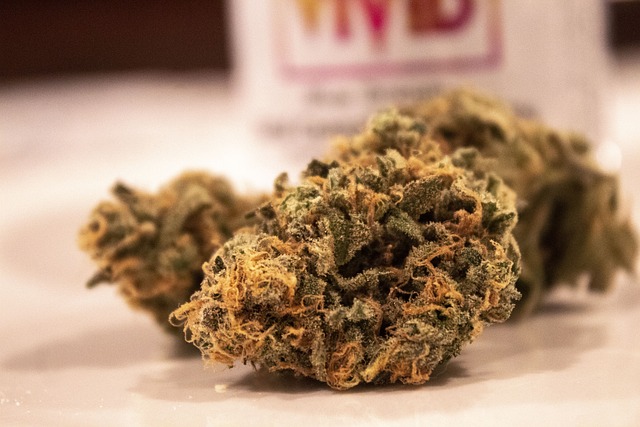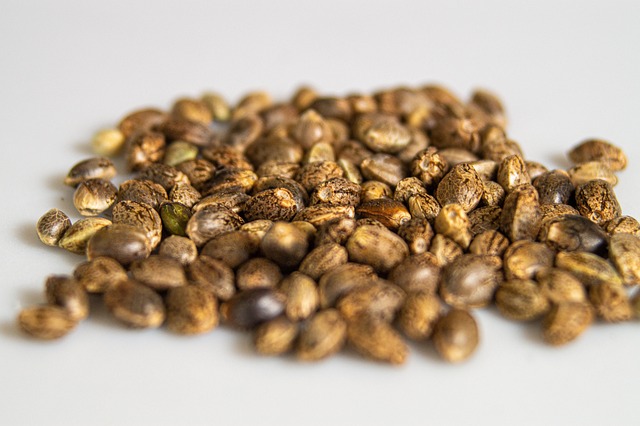Delta 9 THC gummies are a legal consumption method in Texas under specific conditions, with the THC content capped at 0.3% on a dry weight basis from hemp that complies with the 2018 Farm Bill. In Texas, these gummies fall under the Compassionate Use Program for medical use by those with qualifying conditions. Users should be mindful of individual factors like weight, tolerance, and metabolism when consuming Delta 9 THC gummies due to their delayed onset compared to smoking or vaping. Safety is crucial: start with a low dose, wait for effects to set in before consuming more, and store them securely to prevent accidental ingestion by children or pets. With the rise of both medical and recreational use, it's essential to understand Texas's legal standards and handle these products responsibly. Delta 9 THC gummies offer a range of effects, from euphoria to relaxation, but must be sourced legally and used safely. Consumers should seek out transparently labeled products with third-party lab test results, adhere to the state's regulations, and never use these products while engaging in activities requiring sobriety or coordination. Delta 9 THC's legal status in Texas is clear and regulated, ensuring a balance between consumer choice and safety within the bounds of the law.
Delta 9 gummies have emerged as a popular choice for those seeking the benefits of cannabinoids in a convenient, flavorful format. This in-depth guide delves into the world of Delta 9 THC gummies, offering a comprehensive overview that includes their distinction from CBD products, legal standing in Texas, and how to select the ideal gummy for your preferences. Understanding the effects of Delta 9 THC versus CBD is crucial for consumers, especially with the evolving landscape of cannabis-related laws. We’ll navigate the intricacies of dosage and safety while highlighting the legal status and regulations governing these products in Texas. Join us as we explore the nuances of Delta 9 gummies to ensure a responsible and enjoyable experience.
- Understanding Delta 9 Gummies: A Comprehensive Overview
- Delta 9 THC vs CBD: Key Differences and Effects
- Delta 9 Gummies in Texas: Legal Status and Regulations
- How to Choose the Right Delta 9 Gummies for Your Needs
- Dosage and Safety: Navigating Delta 9 Gummies Responsibly in Texas
Understanding Delta 9 Gummies: A Comprehensive Overview

Delta-9 tetrahydrocannabinol (Delta 9 THC) gummies are a popular edible form of cannabis that provide users with a discrete and enjoyable way to experience the effects of this psychoactive compound. Delta 9 THC is one of the major active components found in cannabis plants, and it’s known for its mind-altering effects. In the context of Texas, it’s crucial to understand the legal landscape regarding Delta 9 gummies. As per Texas law, Delta 9 THC gummies are considered legal if they contain less than 0.3% THC on a dry weight basis and are derived from hemp that has been cultivated in accordance with the 2018 Farm Bill. This distinction is significant, as it differentiates Delta 9 THC from its synthetic or isomerized forms, which are not legal under Texas law. Consumers in Texas should ensure that their Delta 9 gummies comply with these regulations to avoid any legal implications. When exploring the benefits and effects of Delta 9 THC gummies, users should be mindful of their dosage, as the onset of effects can take longer than smoking or vaping due to how the body processes edibles. The experience with Delta 9 THC gummies can vary greatly depending on individual factors such as weight, tolerance, and metabolism. Users are advised to start with a low dose and wait for its effects before consuming more, to ensure a safe and enjoyable experience. Additionally, it’s important to store these gummies securely, especially in households with children or pets, to prevent accidental ingestion. With the rise in popularity of Delta 9 THC gummies, both for medicinal and recreational purposes, understanding their legal status, proper usage, and potential effects is essential for users in Texas and beyond.
Delta 9 THC vs CBD: Key Differences and Effects

Delta 9 tetrahydrocannabinol (THC) and cannabidiol (CBD) are two prominent compounds found in the cannabis plant, each with distinct effects and legal statuses. Unlike CBD, which is widely recognized for its therapeutic properties without the psychoactive effects, Delta 9 THC is the primary psychoactive component of cannabis. In Texas, the legal landscape for Delta 9 THC is specific; it is legal under certain conditions as part of the state’s Compassionate Use Program for qualifying medical conditions. Users in Texas who consume Delta 9 gummies will experience a ‘high’, characterized by euphoria, altered perception, and relaxation, due to its direct interaction with the body’s endocannabinoid system. The psychoactive effects of Delta 9 THC can vary widely among individuals, influenced by factors such as dosage, tolerance, and the environment in which it is consumed.
CBD, on the other hand, offers a range of potential health benefits without the mind-altering effects. It interacts with the body’s endocannabinoid system in a different way than Delta 9 THC, primarily by influencing non-psychoactive receptors. This interaction is believed to contribute to its therapeutic properties, which may include pain relief, anti-inflammatory effects, and anxiety reduction. The legal status of CBD is more permissive in Texas; it can be derived from hemp and contain no more than 0.3% THC by dry weight, making it readily available in various forms, including gummies. Both compounds offer unique advantages, but consumers must be aware of their legal standing and the specific effects each has to make informed choices based on their needs and circumstances.
Delta 9 Gummies in Texas: Legal Status and Regulations

In the Lone Star State, the landscape surrounding the legality and regulation of Delta 9 gummies has undergone significant shifts. As of recent updates to Texas law, Delta 9 tetrahydrocannabinol (THC) products, including gummies, are legal provided they contain less than 0.3% THC on a dry weight basis and are derived from hemp that is compliant with the 2018 Farm Bill. The Texas Department of State Health Services plays a pivotal role in overseeing these products, ensuring they adhere to state regulations. Retailers and producers must obtain proper licensing and follow stringent guidelines to sell Delta 9 gummies within Texas borders. Consumers looking to purchase these products should be aware that they are only permitted for recreational use if they meet the aforementioned THC concentration criteria; otherwise, possession and use of Delta 9 THC in higher concentrations are subject to state laws. It’s crucial for both consumers and businesses to stay informed about the evolving regulations to navigate this market legally within Texas.
How to Choose the Right Delta 9 Gummies for Your Needs

When selecting the right Delta 9 gummies, particularly in a state like Texas where their legality is clearly defined, it’s crucial to consider both the legal framework and your personal preferences. As of the knowledge cutoff date, Delta 9 THC products are legal in Texas provided they contain less than 0.3% THC on a dry weight basis, following the 2018 Farm Bill and subsequent state regulations. This threshold ensures that the product remains federally compliant while offering the psychoactive effects of Delta 9. To ensure compliance with these laws, always choose reputable brands that provide third-party lab test results verifying their Delta 9 content and purity.
Furthermore, when choosing Delta 9 gummies tailored to your needs, consider factors such as potency, flavor preferences, and the desired effect. Potency is typically measured in milligrams of Delta 9 per gummy; start with a lower dose if you’re new to cannabinoid products, and gradually increase as needed. Flavors range from traditional fruit options to more exotic tastes, catering to personal preference. Whether you seek relaxation, uplifted mood, or pain relief, different strains can offer varied effects. Always prioritize quality and transparency when selecting your Delta 9 gummies, ensuring a safe and enjoyable experience in line with Texas’s legal landscape.
Dosage and Safety: Navigating Delta 9 Gummies Responsibly in Texas

Delta 9 gummies have become a popular consumption method for those seeking the effects of THC in Texas, where their use is regulated under state law. Understanding dosage and safety is paramount when incorporating these edibles into your routine, as they can vary significantly in potency. In Texas, delta 9 gummies are considered legal provided they contain less than 0.3% THC on a dry weight basis, adhering to the guidelines set forth by the 2018 Farm Bill and subsequent state legislation. However, it’s crucial to approach their use with caution. The psychoactive effects of delta 9 THC can be potent, and overconsumption may lead to undesired experiences. Start with a low dose to gauge individual tolerance, and wait for the full effect before considering an increase in dosage. It’s also wise to purchase from reputable sources to ensure the accuracy of THC levels stated on the packaging. Always adhere to local laws and regulations when using delta 9 gummies in Texas, and remember that driving or operating heavy machinery under the influence is illegal and dangerous. Responsible use involves understanding your body’s response to delta 9 gummies, being aware of the legal framework, and prioritizing safety at all times.
Delta 9 gummies have emerged as a popular choice for consumers seeking the effects of THC within the confines of the law in Texas. This in-depth guide has navigated through the intricacies of understanding what delta 9 gummies are, how they differ from CBD products, and the specific legal landscape governing their use within the state. It has also equipped readers with the knowledge to select the most suitable product for their individual needs while emphasizing the importance of responsible dosage and safety practices. For those in Texas considering delta 9 gummies as part of their wellness routine, this guide serves as a comprehensive resource to make informed decisions within the bounds of the law. Remember that local laws and regulations can change, so it’s always best to stay updated on the latest legal status of these products.
